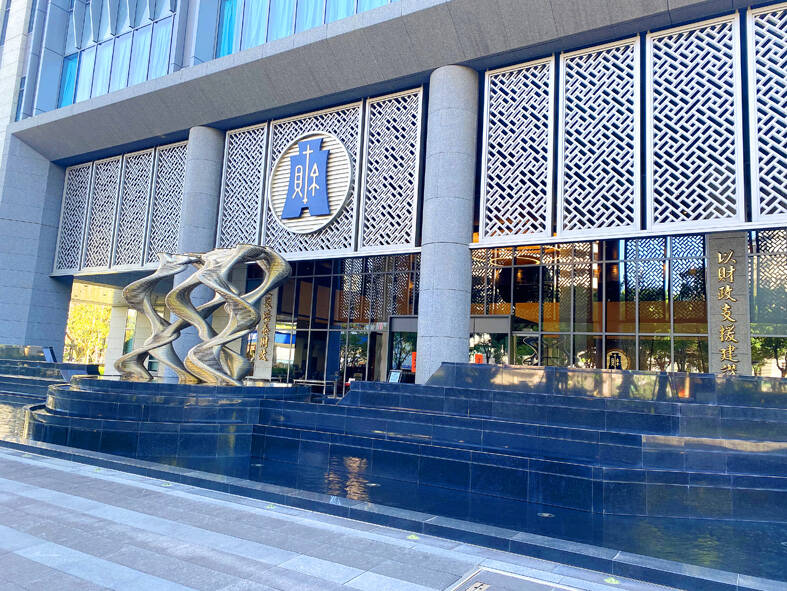Tax revenue last month increased 11.5 percent from a year earlier to NT$216.5 billion (US$6.67 billion), supported by delayed corporate income tax filing, as well as increases in securities transaction and business taxes, the Ministry of Finance said yesterday.
Corporate income tax revenue spiked 29.5 percent year-on-year to NT$10.4 billion, as bad weather late last month led some companies to postpone filing their taxes, the ministry said.
WEAK MANUFACTURING

Photo: Clare Cheng, Taipei Times
In the first seven months of the year, revenue from corporate income tax shrank 16.3 percent to NT$128.5 billion, as most manufacturing sectors continued to take a hit from weak demand amid a global economic slowdown, it said.
Personal income tax revenue grew 7.3 percent to NT$8.4 billion, as revenue from house sales offset the decline in revenue from personal income, the ministry said.
Likewise, personal income tax revenue picked up 11.2 percent to NT$589 billion in the first seven months, as a sizable number of people reaped a windfall from a housing boom and paid more income taxes linked to property deals, it said.
Tax revenue from securities transactions last month soared 41.1 percent annually to NT$31.5 billion, thanks to a hefty 27.4 percent advance in the average daily turnover to NT$585 billion, the ministry said.
The upswing came as foreign institutional players and proprietary traders dumped tech shares in the second half of last month, while mutual funds raised stakes, it said.
HOME BUYING
Tax revenue from land value gains rose 17.8 percent to NT$8.1 billion last month, as the home-buying zeal remained unabated and housing deals in the six special municipalities increased 11.6 percent last month from a year earlier, the ministry said.
As of last month, cumulative tax revenue totaled NT$2.35 trillion, representing a 2.8 percent increase from the same period last year and staying ahead of the government’s budget schedule by 9.6 percent, it said.

When an apartment comes up for rent in Germany’s big cities, hundreds of prospective tenants often queue down the street to view it, but the acute shortage of affordable housing is getting scant attention ahead of today’s snap general election. “Housing is one of the main problems for people, but nobody talks about it, nobody takes it seriously,” said Andreas Ibel, president of Build Europe, an association representing housing developers. Migration and the sluggish economy top the list of voters’ concerns, but analysts say housing policy fails to break through as returns on investment take time to register, making the

NOT TO WORRY: Some people are concerned funds might continue moving out of the country, but the central bank said financial account outflows are not unusual in Taiwan Taiwan’s outbound investments hit a new high last year due to investments made by contract chipmaker Taiwan Semiconductor Manufacturing Co (TSMC, 台積電) and other major manufacturers to boost global expansion, the central bank said on Thursday. The net increase in outbound investments last year reached a record US$21.05 billion, while the net increase in outbound investments by Taiwanese residents reached a record US$31.98 billion, central bank data showed. Chen Fei-wen (陳斐紋), deputy director of the central bank’s Department of Economic Research, said the increase was largely due to TSMC’s efforts to expand production in the US and Japan. Investments by Vanguard International

WARNING SHOT: The US president has threatened to impose 25 percent tariffs on all imported vehicles, and similar or higher duties on pharmaceuticals and semiconductors US President Donald Trump on Wednesday suggested that a trade deal with China was “possible” — a key target in the US leader’s tariffs policy. The US in 2020 had already agreed to “a great trade deal with China” and a new deal was “possible,” Trump said. Trump said he expected Chinese President Xi Jinping (習近平) to visit the US, without giving a timeline for his trip. Trump also said that he was talking to China about TikTok, as the US seeks to broker a sale of the popular app owned by Chinese firm ByteDance Ltd (字節跳動). Trump last week said that he had

STRUGGLING TO SURVIVE: The group is proposing a consortium of investors, with Tesla as the largest backer, and possibly a minority investment by Hon Hai Precision Nissan Motor Co shares jumped after the Financial Times reported that a high-level Japanese group has drawn up plans to seek investment from Elon Musk’s Tesla Inc to aid the struggling automaker. The group believes the electric vehicle (EV) maker is interested in acquiring Nissan’s plants in the US, the newspaper reported, citing people it did not identify. The proposal envisions a consortium of investors, with Tesla as the largest backer, but also includes the possibility of a minority investment by Hon Hai Precision Industry Co (鴻海精密) to prevent a full takeover by the Apple supplier, the report said. The group is